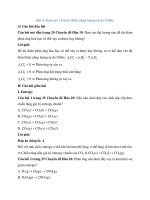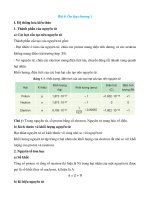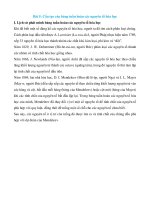BÀI tập LUẬN DNC1 translate one text on the topic SOCIAL ISSUES and the topic NATURE
Bạn đang xem bản rút gọn của tài liệu. Xem và tải ngay bản đầy đủ của tài liệu tại đây (0 B, 34 trang )
ASSIGMENT ON TRANSLATION 1 (1)
You are asked to translate one text on the topic SOCIAL ISSUES from
Vietnamese into English and one text on the topic NATURE from
English into Vietnamese.
The source texts must be authentic and about 200 words each. Complex
sentences and relative clauses must account for at least 40% among
others.
Your assignment should follow the layout:
Part 1: The copies of source texts
Part 2: The translation of the two texts.
Part 3: Some strategies you used when doing the translation or How you
dealt with problems encountered during the process of translation.
(about 300 words)
The topic SOCIAL ISSUES from Vietnamese into English
/>
mat-phuong-huong
Source text: Ngăn giới trẻ sống ảo, mất phương hướng
Preventing young people from living in a virtual and disorienting
life
Sự bùng nổ của công nghệ thông tin và các trang mạng xã hội, bên
cạnh nhiều mặt tích cực lại đang khiến một bộ phận giới trẻ rơi vào
lối sống “ảo”, suy nghĩ lệch lạc và mất phương hướng.
The explosion of information technology and social networking sites,
besides many positive aspects, is causing a part of young people to fall
into a "virtual" lifestyle, thinking erroneously and disoriented.
Nở rộ các trào lưu tiêu cực
The proliferation of negative trends
Mạng xã hội facebook xuất hiện tại Việt Nam, đã tạo thành một “cơn
sốt” đối với giới trẻ và trở thành nơi trút những “hỉ, nộ, ái ố” của mọi
người. Theo đó, nút like (thích) cũng trở nên quen thuộc với mọi người
dùng khi nó thể hiện sự hưởng ứng, đồng tình, đồng cảm của mình đối
với mỗi cập nhật trạng thái của bạn bè trên facebook. Sẽ chẳng có gì để
nói nếu như nó được sử dụng đúng mục đích, thế nhưng nhiều người lại
sử dụng nút like khá tùy tiện, lệch lạc thậm chí có người phát cuồng. Để
“câu like”, một cô gái 13 tuổi ở tỉnh Khánh Hòa đăng trên dòng trạng
thái (status) nội dung nếu đạt mức 1.000 lượt like cô sẽ đốt trường. Sự
việc sau đó được cộng đồng mạng chia sẻ “chóng mặt” và chỉ sau một
đêm, status đó đã vượt 1.000 like khiến cơ gái lo sợ, tìm cách lẩn trốn
bạn bè. Tuy nhiên, do sức ép của “nút like” từ bạn bè, cộng đồng mạng
mà cô gái này đã phải thực hiện bằng hành động mang xăng vô đốt
trường như đã tuyên bố. Hoặc gần đây, trào lưu “nói và làm của thanh
niên Việt Nam” cũng đang nở rộ theo tuyên bố của một thanh niên sống
tại Thành phố Hồ Chí Minh. Theo đó, nam thanh niên này đã tuyên bố
hùng hồn trên facebook rằng “nói và làm, cần 40.000 like để tự thiêu,
nhảy cầu Tân Hóa” và thanh niên này đã thực hiện thật với sự chứng
kiến của hàng trăm “tín đồ” facebook tị mị.
The social network Facebook that appeared in Vietnam has created a
"fever" for young people and has become a place to vent the "happiness,
anger, and resentment" of everyone. Accordingly, the like button has
also become familiar to all users when it shows their response,
agreement and sympathy for each status update of their friends on
Facebook. There will be nothing to say if it is used for the right purpose,
but many people use the like button quite arbitrarily, misleadingly even
some people go crazy. In order to "catch like", a 13-year-old girl from
Khanh Hoa province posted on her status line the content that if she
reached 1,000 likes, she would burn the school. The incident was then
shared by the online community "dizzy", and after only one night, the
status surpassed 1,000 likes, making the girl scared, trying to hide from
her friends. However, due to the pressure of the "like button" from
friends and the online community, this girl had to bring gasoline to burn
the school, as stated. Or recently, the trend of "speaking and doing of
Vietnamese youth" is also flourishing, according to the statement of a
young man living in Ho Chi Minh City. Accordingly, this young man
eloquently declared on Facebook that "saying and doing, it takes 40,000
likes to set himself on fire and jump from Tan Hoa bridge", and this
young man did it with the witness of hundreds of " curious Facebook
followers".
Theo TS Nguyễn Hoàng Khắc Hiếu, Trưởng bộ môn Tâm lý học ứng
dụng, Đại học Sư phạm Thành phố Hồ Chí Minh, hành động đốt trường,
tự thiêu, nhảy sông… để câu like là một minh chứng rõ nét cho trào lưu
“sống ảo” của một bộ phận bạn trẻ ngày nay. Trào lưu tiêu cực này đã
lên đến đỉnh điểm khi một số bạn bắt đầu bất chấp cả tính mạng của
mình để có thể nổi tiếng phút chốc trên mạng xã hội.
According to Dr. Nguyen Hoang Khac Hieu, Head of the Department of
Applied Psychology, Ho Chi Minh City University of Education, the act
of burning schools, setting themselves on fire, jumping in the river... to
like sentences is a clear demonstration of the trend " virtual life” of a
part of young people today. This negative trend has reached its peak
when some of you have started risking your life to be famous for a
moment on social networks.
Thực tế, trào lưu sống “ảo” trên mạng đang ngày càng phổ biến khiến
khơng ít bạn trẻ bị ảnh hưởng và hành động theo hướng tiêu cực và gây
ra những hậu quả nghiêm trọng cho xã hội như cướp của, giết người
ngày càng man rợ và máu lạnh, đặc biệt là sự vơ cảm trước những khó
khăn của người khác. Những vụ thảm sát cả gia đình tại Bình Phước, vụ
nam thanh niên mới 20 tuổi giết chết hai mẹ con tại Bà Rịa - Vũng Tàu
hay như vụ đãi tiệc sinh nhật bằng “ma túy” của một “thiếu gia” tại
khách sạn với 80 bạn tham dự mới đây… là những minh chứng.
In fact, the trend of "virtual" living online is increasingly popular,
causing many young people to be affected and act in a negative way and
cause serious consequences for society such as robbery and murder.
savage and cold-blooded, especially insensitive to the difficulties of
others. The massacres of the whole family in Binh Phuoc, the case of a
20-year-old young man killing mother and daughter in Ba Ria - Vung
Tau or the birthday party with "drugs" of a "young master" at the hotel
with 80 participants recently… are proof.
Thạc sỹ Tâm lý học Trần Thị Thu Vân, Phịng khám Chăm sóc giảm nhẹ
- tâm lý, Bệnh viện Đại học Y Dược Thành phố Hồ Chí Minh, cho rằng
lối sống “ảo”, lệch lạc từ mạng xã hội có nhiều tác hại tiêu cực, ảnh
hưởng khơng tốt đến bản thân, học tập, sinh hoạt của đối tượng tiếp
nhận và cuộc sống của những người xung quanh. Theo nghiên cứu,
những ảnh hưởng của việc “nghiện” facebook độc hại không kém so với
thuốc lá hay các chất gây nghiện khác. Trên mạng xã hội, con người có
thể cảm thấy bị mê đắm khi đăng tải các trạng thái, làm giảm tương tác
với mọi người xung quanh, gây mất ngủ, học hành kém hay sao lãng
những hoạt động đời thực khác, thậm chí có nhiều người có nguy cơ
trầm cảm.
Master of Psychology Tran Thi Thu Van, Clinic of Palliative Care -
Psychology, University of Medicine and Pharmacy Hospital, Ho Chi
Minh City, believes that a "virtual" lifestyle, deviating from social
networks, has many harmful effects. Negatively affect the self, study,
activities of the recipient and the lives of those around them. According
to research, the effects of being "addicted" to Facebook are no less
harmful than smoking or other addictive substances. On social networks,
people can feel infatuated when posting statuses, reducing interaction
with people around, causing insomnia, poor study or other distractions
from real-life activities; many people are at risk of depression.
Lý giải nguyên nhân trào lưu sống “ảo” đang phát triển khá nhanh trong
một bộ phận giới trẻ, Thạc sỹ tâm lý Tô Nhi A, trường CĐ Sư phạm
Trung ương TP Hồ Chí Minh cho biết giới trẻ sống “ảo” nhiều bởi các
bạn khơng có được những hoạt động cá nhân, không chia sẻ được với
gia đình, thầy cơ... Sự bùng nổ của cơng nghệ thông tin, mạng xã hội tạo
cho giới trẻ cảm giác được giải tỏa thể hiện bản thân, cơ hội nổi bật
trước đám đơng, có được những giá trị độc đáo. Thực tế, các bạn mới
chỉ có những khát khao cịn năng lực chưa thực hiện được nên mạng xã
hội là điều kiện lý tưởng để các bạn phù phép tơ vẽ bản thân mình.
Explaining the reason why the trend of "virtual" living is growing quite
quickly among young people, Master of Psychology To Nhi A, from the
Central College of Education in Ho Chi Minh City, said that young
people live "virtual" a lot because you cannot have personal activities,
cannot share with family, teachers... The explosion of information
technology, social networks gives young people the feeling of being free
to express themselves, the opportunity to stand out from the crowd, get
unique values. In fact, you only have unfulfilled desires and abilities, so
social networks are the ideal conditions for you to enchant and paint
yourself.
“Những trào lưu, hành động tiêu cực trên mạng của giới trẻ căn cơ là do
các bạn thiếu sự định hướng, quan tâm từ gia đình hoặc khơng tiếp cận
được giá trị sống tích cực, sống đẹp và lầm tưởng rằng việc “nổi đình
nổi đám” trên mạng là thể hiện đẳng cấp, tiếng nói và hình ảnh của
mình. Mặt khác, việc nổi tiếng trên mạng có vẻ dễ dàng quá nên các bạn
lao vào mà không nghĩ rằng giá trị đó có thực hay khơng, hay đó chỉ là
những con số ảo và các bạn khơng hình dung được hậu quả về sau”,
Thạc sỹ tâm lý Tô Nhi A cho biết thêm.
"The negative online trends and actions of young people are mainly due
to their lack of orientation and concern from their families or their
inability to access the value of a positive and beautiful life, and
mistakenly believe that being "popular". "Being popular" online is to
show their class, voice and image. On the other hand, being famous
online seems so easy that you jump in without thinking if the value is
real or not, or it is just a virtual number, and you cannot imagine the
consequences.", Psychology Master To Nhi A added.
Là người thường xuyên tiếp xúc với các bạn trẻ là học sinh, sinh viên,
ông Lê Xuân Dũng, Phó Giám đốc Trung tâm Hỗ trợ học sinh, sinh viên
Thành phố Hồ Chí Minh, cho rằng nguyên nhân dẫn đến những hành
động lệch lạc của giới trẻ hiện nay xuất phát từ việc “ăn theo” trào lưu
trên mạng xã hội. Bởi, khi thấy một cá nhân khác thực hiện và nhận
được nhiều lượt theo dõi, quan tâm thì bản thân cũng muốn điều tương
tự và muốn được nổi tiếng.
As a person who regularly interacts with young students who are
students, Mr. Le Xuan Dung, Deputy Director of the Center for Student
and Student Support in Ho Chi Minh City, said that the cause of deviant
actions The current youth's happiness comes from "following" the trend
on social networks. Because when I see another individual perform and
receive a lot of followers and interest, I also want the same thing and
want to be famous.
“Đa phần những trường hợp này rất ít mơi trường tiếp xúc bạn bè, hoạt
động bên ngoài; thiếu sự quan tâm của người thân, bạn bè nên mới cảm
thấy sự quan tâm của xã hội ảo là quan trọng và là sự khẳng định bản
thân. Đặc biệt, cũng do thiếu sự quan tâm, định hướng của gia đình, nhà
trường cho nên giới trẻ mới dẫn đến suy nghĩ lệch lạc mà không nghĩ
đến hành động của mình gây hậu quả nghiêm trọng cho bản thân và mọi
người xung quanh”, anh Dũng cho biết.
"Most of these cases have very little contact with friends or outside
activities; Lacking the attention of relatives and friends, I feel that the
interest of the virtual society is important and is an affirmation of
oneself. In particular, due to the lack of attention and orientation from
families and schools, young people lead to distorted thinking without
thinking about their actions, causing serious consequences for
themselves and everyone around. ", said Mr. Dung.
Tạo ra sân chơi thực tế
Create a realistic playground
Để chữa “bệnh” sống “ảo” trong giới trẻ hiện nay, theo ông Lê Xuân
Dũng, nhà trường, gia đình cần quan tâm hơn nữa đến các bạn trẻ. Các
tổ chức trong nhà trường cần phải tăng cường thông qua các hoạt động
để học sinh nâng cao bản lĩnh trước những luồng thông tin trên mạng xã
hội, khước từ những cám dỗ. Đặc biệt, cần tạo ra nhiều sân chơi thực tế
hơn là môi trường ảo cho học sinh, sinh viên hiện nay. “Đối với sinh
viên, học sinh trước khi làm một hành động nào đó phải suy nghĩ đến
hậu quả và tránh a dua theo bạn bè. Chỉ có các mối quan hệ thực tế mới
giúp cho các bạn trưởng thành và suy nghĩ thấu đáo hơn là các mối quan
hệ ảo trên mạng”, ông Dũng cho biết.
To cure the "illness" of living "virtual" among young people today,
according to Mr Le Xuan Dung, schools and families need to pay more
attention to young people. Organizations in the school need to strengthen
through activities so that students can improve their courage in the face
of information flows on social networks and refuse temptations. In
particular, it is necessary to create more real playgrounds than virtual
environments for students today. "For students, before doing a certain
action, students must think about the consequences and avoid following
their friends. Only real-life relationships can help you grow up and think
more clearly than virtual relationships online," Dung said.
TS Nguyễn Hoàng Khắc Hiếu cũng cảnh báo: “Các bạn trẻ cần hiểu trí
tuệ mới chính là thứ giúp bạn nổi tiếng hoặc thành cơng thật sự. Thay vì
bỏ thời gian và cơng sức để thu thập “like” thì hãy dùng thời gian, cơng
sức đó thu nhập kiến thức, hình thành kỹ năng để tạo ra thành quả. Còn
các bạn trẻ khi mạo hiểm tính mạng, bạn có thể có số “like” cao nhất
thời nhưng nếu gặp sự cố sẽ mất mạng, tổn thương hoặc để lại di chứng
cho đến suốt đời. Điều đó có nghĩa là bạn tàn phá cơ thể, tàn phá công
lao ni dưỡng của gia đình, tàn phá cả cơ hội tương lai. Riêng cư dân
mạng hãy tỉnh táo, đừng bao giờ phí nút “like” cho những hành động
suy nghĩ tiêu cực, nếu khơng chính chúng ta là kẻ tiếp tay cho những cá
nhân "thèm khát nổi tiếng đến mức khơng thể tin nổi" và đưa họ vào
vịng nguy hiểm.
Dr. Nguyen Hoang Khac Hieu also warned: “Young people need to
understand that wisdom is what makes you famous or truly successful.
Instead of spending time and effort to count how many “likes”, better to
use that time and effort to gather knowledge, form skills to create
results. As for young people, when you risk your life, you may have the
highest number of "likes" for a while, but if something goes wrong, you
will lose your life, get hurt or leave sequelae for the rest of your life.
That means you destroy your body, destroy your family's upbringing,
and destroy future opportunities. Particularly, netizens, please be alert,
never waste the "like" button for negative thinking actions, otherwise,
we are the accomplices for individuals "unbelievably hungry for fame".
And put them in danger.
Translated text: The topic NATURE from English into Vietnamese.
Nature Can Save Humanity From Climate Doom—but Not On Its
Own
/>
doom-but-not-on-its-own/
By restoring ecosystems, conservationists can help the land
sequester carbon. But it's still no substitute for drastically cutting
emissions.
THE BIGGEST HINT nature ever gave humanity was when it
sequestered fossil fuels underground, locking their carbon away from the
atmosphere. Only rarely, like when a massive volcano fires a layer of
coal into the sky, does that carbon escape its confines to dramatically
warm the planet.
But such catastrophes hint at a powerful weapon for fighting climate
change: Let nature do its carbon-sequestering thing. By restoring forests
and wetlands, humanity can bolster the natural processes that trap
atmospheric carbon in vegetation. As long as it all doesn’t catch on fire
(or a volcano doesn’t blow it up), such “nature-based solutions,” as
climate scientists call them, can help slow global warming.
Earlier this month, scientists put a number on how much of a reduction
in global heating these solutions might buy us. Writing in the
journal Nature, they used a previous calculation of how much carbon
such campaigns could sequester and married that with global warming
scenarios from the Intergovernmental Panel on Climate Change.
Basically, they tallied how much of a temperature change could be
staved off by keeping this amount of carbon out of the atmosphere
They found that with an ambitious yet realistic worldwide campaign,
humanity might reduce peak warming by 0.1 degrees Celsius under a
scenario that assumes a 1.5-degree rise in global temperatures by the
year 2055. In a scenario assuming a 2-degree rise by 2085, the savings
would be 0.3 degrees. That might not sound like much, in the grand
scheme
of
things.
But
because
nature-based
solutions keep
onsequestering carbon as long as those habitats remain healthy, in that
1.5-degree scenario we’d actually shave off 0.4 degrees of warming by
the year 2100. And that’s a significant difference.
“What we found—which is crucial—is that after that, it continues
acting, and [nature-based solutions] have this really important role in
cooling our planet up to the end of the century and beyond,” says
ecosystems scientist Cécile Girardin of the University of Oxford, the
lead author on the paper describing the work. “We're absolutely not
saying nature-based solutions are the solution for climate change.
That's not what the message here is. It’s just a more realistic view of
what they can achieve and how we can achieve it.”
So what do these solutions look like? Generally speaking, they aim to
both sequester carbon and produce some additional social or ecological
benefit.
Take forest restoration as a simple example. By encouraging the growth
of native species, the vegetation will suck in CO 2 and expel oxygen as
it grows, sequestering carbon in all that plant tissue. One co-benefit is
bolstering biodiversity: As the native plants proliferate, so will native
animals. In eastern India, the authors note in their paper, another
benefit is that protecting mangrove forests helps them absorb both
carbon and the impact of cyclone storm surges, as the roots dissipate
the wave energy, which shields coastal communities. (Plus, no matter
where you do it, you get a nice forest for people to enjoy.)
Nature-based solutions need not be about roping off ecosystems to keep
them pristine. In Brazil, for instance, some farmers are switching from
raising cattle—which requires clear-cutting land—to growing cocoa.
Not only does the plant happily grow tucked into the shade of a
rainforest, but it’s been shown to boost biodiversity there. As an added
bonus, farmers get to work under a canopy instead of in an open field,
thus avoiding heat stroke. The researchers write that in Sierra Leone,









